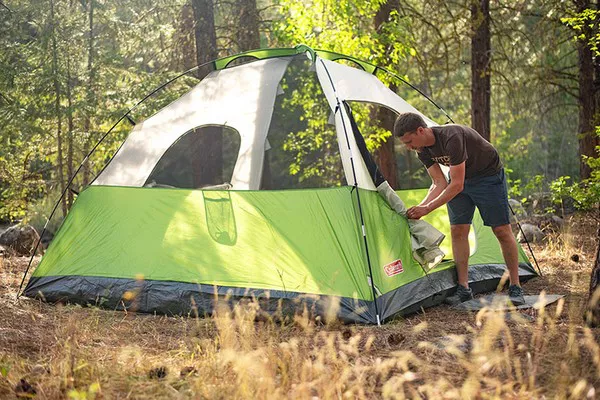Embarking on a week-long camping trip offers the chance to fully immerse oneself in nature and disconnect from the bustle of daily life. However, to ensure a comfortable and enjoyable experience, proper planning and packing are essential. From shelter and cooking essentials to clothing and safety gear, having the right items on hand can make all the difference. Let’s explore a comprehensive list of what to bring on a week-long camping adventure.
1. Shelter and Sleeping Gear
First and foremost, a reliable shelter is crucial for a week-long camping trip. Consider bringing a sturdy tent that is spacious enough for your group and provides adequate protection from the elements. Additionally, bring a footprint or tarp to place under the tent for added insulation and protection from moisture. Don’t forget to pack extra stakes and guy lines for securing the tent in various terrains.
For a comfortable night’s sleep, invest in a high-quality sleeping bag rated for the expected temperatures. Choose a sleeping bag with appropriate insulation—down or synthetic—based on the climate of your camping destination. A sleeping pad or inflatable mattress adds insulation and cushioning from the ground, enhancing sleep quality after a day of outdoor activities.
2. Cooking and Food Supplies
Proper nutrition is essential during a week-long camping trip. Plan your meals ahead and pack non-perishable food items such as dehydrated meals, energy bars, nuts, and dried fruits. Don’t forget to bring a reliable camping stove or backpacking stove along with extra fuel canisters. Cooking utensils like a lightweight pot, pan, and utensil set are necessary for preparing meals.
Carry a cooler with perishable food items like fresh vegetables, fruits, and meats for the first few days of the trip. Ensure you have airtight containers, zip-lock bags, and a small cutting board for food preparation. Remember to pack basic condiments, spices, and cooking oil for flavoring your meals.
3. Clothing and Footwear
Packing appropriate clothing for varying weather conditions is key to staying comfortable throughout the trip. Bring moisture-wicking and quick-drying clothing suitable for layering, including:
- Base layers: Moisture-wicking tops and bottoms for insulation.
- Insulating layers: Fleece jackets or down vests to retain body heat.
- Outer layers: Waterproof and breathable jacket and pants for rain and wind protection.
- Extra clothing: Include extra socks, underwear, and a warm hat for colder nights.
Choose sturdy and comfortable hiking boots that provide ankle support and are broken in before the trip. Also, pack camp shoes or sandals for lounging around the campsite.
4. Hydration and Water Purification
Staying hydrated is vital during outdoor activities. Pack a durable water bottle or hydration reservoir to carry an adequate supply of water. Consider bringing a water filter, purifier, or purification tablets for treating water from natural sources like rivers or lakes.
5. Navigation and Safety Gear
Ensure you have the necessary tools to navigate and stay safe in the wilderness. Bring a detailed map of the area along with a compass or GPS device. Carry a fully stocked first aid kit containing essentials like bandages, antiseptic wipes, pain relievers, and blister treatment.
Other safety gear includes a multi-tool or pocket knife, a headlamp or flashlight with extra batteries, and a whistle for signaling in emergencies. It’s also wise to carry a basic repair kit for your camping gear, including duct tape, spare tent poles, and sewing supplies.
6. Personal Items and Toiletries
Pack personal hygiene items in travel-sized containers to save space. Essentials include:
- Toothbrush and toothpaste
- Biodegradable soap and shampoo
- Hand sanitizer and wet wipes
- Toilet paper in a waterproof bag
- Sunscreen and lip balm with SPF
- Insect repellent
- Prescription medications
7. Leisure and Entertainment
While the focus of a camping trip is often on nature, downtime at the campsite can be enhanced with some leisure items. Consider bringing a book, journal, or playing cards for relaxing evenings around the campfire. A lightweight camp chair or hammock adds comfort during downtime.
8. Leave No Trace Essentials
Lastly, prioritize leaving no trace by packing out all trash and minimizing impact on the environment. Bring sturdy garbage bags for collecting waste and disposing of it properly after the trip. Follow principles of Leave No Trace by respecting wildlife, staying on designated trails, and minimizing campfire impacts.
Conclusion
In conclusion, preparing for a week-long camping adventure involves strategic packing of essential gear tailored to your destination and planned activities. By prioritizing shelter, food, clothing, safety, and environmental responsibility, campers can ensure a rewarding and enjoyable outdoor experience. Take time to plan and pack thoughtfully, and you’ll be well-equipped to embrace the serenity of nature on your upcoming week-long camping trip.

